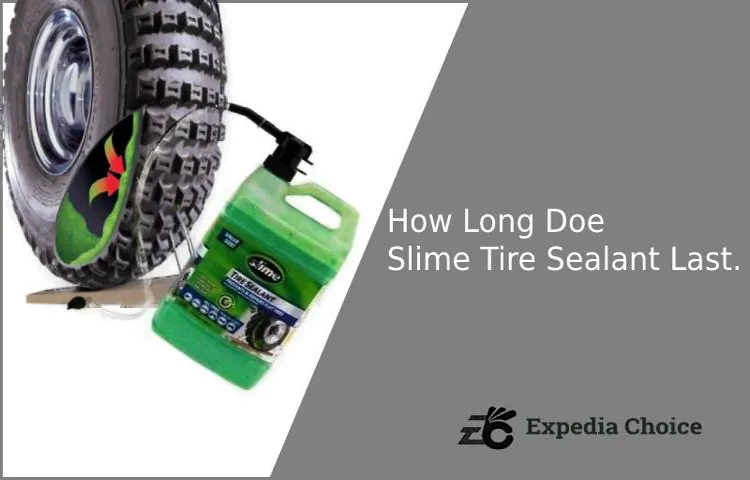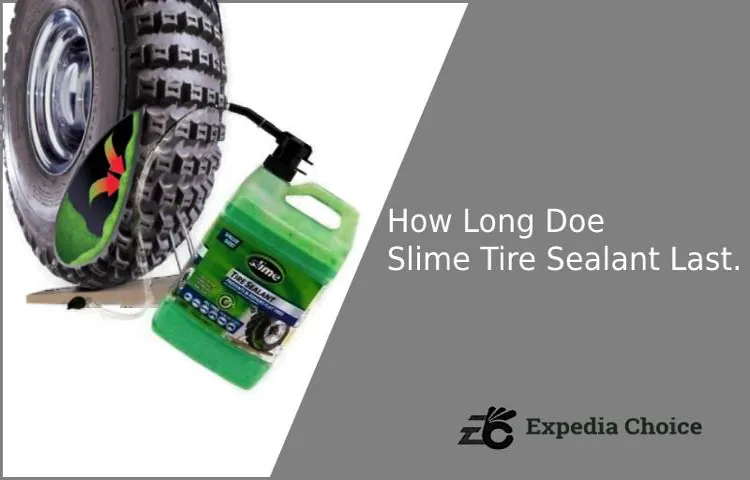Tire sealant is a widely popular solution for punctured tires. It is a simple way to get back on the road without having to replace a tire or call for assistance. But, how long does tire sealant last before needing to be replaced? The answer isn’t as straightforward as one might think, as there are a few variables that come into play.
In this blog post, we will discuss the factors that affect tire sealant life expectancy and how to make the most out of your tire sealant. So, strap in and get ready to learn everything you need to know about tire sealant!
What is Tire Sealant?
Tire sealant is a liquid solution that’s applied into a tire through the valve stem. It’s designed to plug punctures and flatten tires, providing a quick fix for the driver until they’re able to properly have the tire repaired or replaced. One of the frequently asked questions about tire sealant is: “How long does tire sealant last?” Well, the lifespan of tire sealant depends on a few factors, such as the brand and quality of the product, the size and type of the tire, as well as the conditions in which the vehicle is driven.
Ideally, most tire sealants can last for several months to a year, while some may last up to three years. However, it’s important to remember that tire sealant is only a temporary fix and should not be used as a permanent solution for tire issues. It’s still crucial to have your tire checked by a professional and have any damages repaired as soon as possible for your safety while driving.
Definition and Types
Tire sealant is a liquid substance that is used to repair punctures and leaks in tires. It is a convenient and effective way to fix a flat tire quickly without having to change it entirely, especially for emergencies. There are two types of tire sealant commonly used: those that are injected into the tire through the valve stem, and those that are sprayed directly into the tire.
The former is more common and typically used for smaller punctures, while the latter is often used in larger punctures or when the rim needs sealing. Both types work by filling the puncture or leak with a sealant material that hardens to create a patch to prevent air from escaping. Tire sealant is an excellent temporary solution for leaks or punctures, but it is crucial to have the tire inspected and properly repaired or replaced by a professional as soon as possible.

How It Works
Tire sealant is a liquid solution that is injected into the tire to seal any punctures or leaks that may cause a flat tire. It is a quick and easy solution that can help you avoid time-consuming and costly repairs or replacements. Tire sealant works by coating the inside of the tire with a layer of sealant that fills any holes or leaks in the tread.
Once the sealant is in place, it creates a seal that prevents air from escaping and keeps your tire inflated. It works instantly, providing you with peace of mind and confidence on the road. So, if you want to avoid the hassle of changing a flat tire on the side of the road, consider using tire sealant to keep your tires healthy and happy.
How Long Does It Last?
“How long does tire sealant last?” is a common question among car owners who want to ensure the safety of their tires on the road. The answer varies depending on several factors, including the type of sealant, the size of the puncture, the age of the tire, and the driving conditions. Generally, most tire sealants can last for several months to a few years before needing a replacement.
However, it’s important to note that sealant effectiveness may decrease over time. It’s recommended to check the sealant periodically and replace it if necessary to avoid any potential tire failures. Moreover, it’s also necessary to read the label and instructions of the sealant product to understand its specific lifespan and maintenance requirements, providing safety and peace of mind to the driver.
Using a high-quality tire sealant can ensure the safety of the driver and passengers on the road and prevent unnecessary tire replacements.
Factors That Affect Longevity
Longevity When it comes to the question of how long something lasts, there are many factors that can impact the answer. The same is true when considering the lifespan of a living organism, such as a human being. Genetics play a significant role in determining how long we live, as certain genes can predispose individuals to age-related diseases such as Alzheimer’s or cancer.
Lifestyle factors also play a key role, including diet, exercise, and stress levels. A healthy diet rich in fruits and vegetables, coupled with regular physical activity, can help to promote longevity. Additionally, avoiding risky behaviors such as smoking and excessive alcohol consumption can also increase lifespan.
Other factors that can influence longevity include access to quality healthcare, environmental factors, and socioeconomic status. While there is no guarantee of a long life, taking steps to minimize risk factors and promote overall health can increase the likelihood of living a longer, healthier life.
Average Lifespan of Tire Sealant
Tire Sealant; Lifespan; Last Tire sealant is a great tool to have on hand for roadside emergencies. It can plug small punctures and slow leaks, allowing you to drive to a safe location for tire replacement or repair. But, how long does this sealant last before it goes bad? On average, most tire sealants have a lifespan of 2-4 years from the date of manufacture.
However, this may vary depending on the brand and type of sealant. It’s essential to check the expiration date on the can before using it, as expired sealant may not work effectively and may even cause further damage to the tire. Additionally, extreme temperatures may affect the longevity of the sealant, so it’s best to store it in a cool, dry place.
Overall, it’s essential to keep track of your tire sealant’s expiration date to ensure that it’s effective when you need it most.
Signs That It Needs to be Replaced
When it comes to replacing your roof, there are a few signs that you should keep an eye out for. While the lifespan of a roof depends on many factors, such as the material used and weather conditions, most roofs will last around 20-25 years. If your roof is reaching this age range, it may be time to start checking for signs of wear and tear.
Some of the most common signs that your roof needs replacing include leaks, missing or damaged shingles, and visible damage or wear. If you notice any of these signs, it’s important to take action quickly to prevent further damage to your home. Regular maintenance and inspections can also help extend the lifespan of your roof.
By keeping an eye out for these signs and properly maintaining your roof, you can ensure that it lasts as long as possible.
How to Extend Its Lifespan?
“How long does tire sealant last?” is a common question among car owners who use this handy product to fix punctures and prevent flat tires. The truth is, the lifespan of tire sealant can vary depending on various factors such as the brand, type, and conditions of use. Generally, most tire sealants can last for up to two years before requiring a reapplication.
However, it’s worth noting that some products can lose effectiveness before the expiration date if not stored correctly or exposed to extreme temperatures or humidity. To extend the lifespan of your tire sealant, it’s essential to follow the instructions carefully and inspect your tires regularly for any signs of a leak or damage. Also, it’s a good idea to replace your tire sealant every few years to ensure that it’s in excellent working condition when you need it the most.
Regularly Check Your Tires
Taking care of your vehicle’s tires is key to extending their lifespan and ensuring safe driving. Regularly checking your tires is one of the most important things you can do to maintain them. Remember to inspect them visually on a monthly basis for any signs of wear and tear, such as cracks or bulges.
Additionally, make sure to check your tire pressure at least once a month, as under or overinflated tires can lead to poor handling and reduced fuel efficiency. Don’t forget to rotate your tires regularly as well to ensure even wear and prolong their lifespan. By taking these simple steps, you’ll not only save money by avoiding premature tire replacements but also enjoy a safer and smoother driving experience.
So, don’t forget to give your tires the attention they deserve.
Avoid Extreme Temperatures
If you want to extend the lifespan of your electronic devices like smartphones, laptops, or tablets, then avoiding extreme temperatures is crucial. Exposing your device to excessive heat or cold can cause damage to its internal components, leading to its malfunctioning. Extreme heat can cause the battery to swell or even explode, while extreme cold can freeze the liquid inside the battery, affecting its performance.
Therefore, it’s essential to keep your devices away from direct sunlight or any heat source like radiators, stoves, or ovens. On the other hand, avoid storing your devices in cold places like the freezer or garage during winters. Instead, keep them in a temperature-controlled environment, preferably at room temperature.
By doing so, you can ensure that your device works efficiently for longer, saving your time and money on repairs or replacements.
Conclusion: Is Tire Sealant Worth It?
In conclusion, tire sealant can last anywhere from several months to several years, depending on a variety of factors. However, it’s important to remember that while sealant may temporarily fix a puncture, it’s not a long-term solution and should be used as a temporary fix until the tire can be properly repaired or replaced. Just like a trusty sidekick, tire sealant is always there to save the day when you need it, but it’s not going to stick by your side forever.
So, keep a bottle handy and use it wisely – but don’t forget to give your tires the TLC they deserve!”
FAQs
What is tire sealant?
Tire sealant is a liquid compound used to seal small punctures in tires.
How long does tire sealant last?
The lifespan of tire sealant depends on the brand and type. Some can last up to 2-3 years, while others may only last a few months.
Can tire sealant fix a large puncture?
No, tire sealant is only suitable for small punctures. Large punctures or cuts will require a patch or replacement.
Is tire sealant safe for all types of tires?
No, some tire sealants may not be suitable for certain types of tires, such as those with a TPMS (Tire Pressure Monitoring System). Always check the label and manufacturer’s guidelines before use.
Can tire sealant be used as a preventative measure?
Yes, some tire sealants can be used as a preventative measure to help prevent punctures from occurring. However, it is not a guarantee and should not replace regular tire maintenance.
Can tire sealant damage my rims?
Some tire sealants may damage alloy rims. It is important to check the label and make sure the product is safe for your specific type of rim.
How do I remove tire sealant from my tire?
Tire sealant can be removed using a simple solution of soap and water. However, it is not recommended to use tire sealant as a long-term fix and the tire should be inspected by a professional.

